GRBusiness
ATF delegates say private sector crucial to successful AfCFTA implementation


By Sandra Nnaemeka
The 2018 Africa Trade Forum concluded in Lagos, Nigeria, with delegates agreeing that while governments need to set a conducive environment through collective and coordinated actions for the successful implementation of the African Continental Free Trade Area (AfCFTA), the private sector should be the main driver of the AfCFTA.
They also agreed that complementary interventions to boost competitiveness and reduce the high costs of doing business on the African continent would be crucial to ensure win-win gains from the AfCFTA – these will require proactive policies and programmes in the areas of infrastructure, financing, skills development, trade facilitation and quality infrastructure.
“In implementing the AfCFTA we must also make sure not to forget MSMEs, women traders, smallholder farmers and informal cross border traders, who represent the majority of Africa’s trading community, and are crucial to driving poverty reduction efforts,” Economic Commission for Africa’s Regional Integration and Trade Division Director, Stephen Karingi said in summing up the major takeaways from the Forum.
Delegates agreed the establishment of new business models, including renewable energy mini grids, was key to ensure efficient and sustainable access to electricity and help fill the existing gap.
“The recommendation is that we should promote new and reinforce existent sub-regional power pools within the continent,” Mr. Karingi said.
Data, delegates agreed, was critical for the implementation of the AfCFTA. Countries, regional economic communities and the African Union Commission need to understand trade patterns to determine the correct strategies. Data is also central to the monitoring of the AfCFTA.
“Africa needs to design a data economy strategy to ensure that it is not vulnerable through data exposure caused by data storage in other regions. The combination of data and technology can address the challenges around formalisation of trade,” added Mr. Karingi in his closing remarks.
On agriculture, delegates said the AfCFTA by integrating African economies, offers opportunities for the continent to reduce its food imports from the rest of the World by increasing intra-African trade of processed agro-food products. For this to happen, effective implementation of the Agreement is key, in addition to removing non-tariff barriers to trade. Critical to this is to create an environment that will support small farmers and small producers (SMEs) to have timely access to markets, both output and input markets.
Speaking at the forum, Rockefeller Foundation’s Vice President, Global Policy and Advocacy, Christine Heenan, emphasized the importance of partnerships in ensuring the AfCFTA was a real game changer in Africa.
She said an online poll commissioned by Rockefeller was very compelling with more than 83 percent of respondents from across the continent saying the AfCFTA was important for Africa’s development. The poll is open until December 31.
“Engaging stakeholders remains very important,” she said, adding the poll meant a lot in terms of inclusivity of common African voices in the implementation of the African Continental Free Trade Agreement.
The Rockefeller Foundation, Ms. Heenan said, believed and relied on its partners for collective action that leads to progress on the continent.
In his closing remarks AUC’s Trade and Industry Commissioner, Albert Muchanga said six African countries have not yet signed the AFCFTA but two were expected to do so by December.
“African countries have resolved and are committed to making the AfCFTA a reality and there is no going back. We have to continually beat the challenges and use opportunities to come up with solutions,” he said.
Nigeria’s Chief Trade Negotiator, Ambassador Chiedu Osakwe, said to build a free trade area, Africa has to be at ease with the process of sincere debates on its trade policies.
“The European Union dealt with a lot of continuous debate for a long period of time. African countries need to work on consensus building, being at ease with challenges on ideas, methodologies and processes in order to be at ease with the negotiations process, “Ambassador Osakwe said.
On the next steps, Mr. Karingi said the ECA with financial support of the EU was offering technical assistance to support Member States in developing comprehensive AfCFTA National Implementation Strategies.
These strategies will: Identify new opportunities for diversification, industrialization and value chain development; identify current constraints to intra-African trade which must be addressed; recommend steps required for each country to take full advantage of national, regional and global markets in the AfCFTA context; align to existing policy frameworks at the national, regional and continental levels; and adopt a nationally-driven multi-stakeholder participatory approach.
The Forum highlighted the crucial importance of advocacy, consultations and consensus-building on the continent around its major programmes.Mr. Karingi thanked Nigeria and the Government of Lagos State for hosting the forum and for their dedicated support and collaboration in the lead up to this Forum.
“Although Nigeria has not yet signed the AfCFTA, it is in many ways many steps ahead in ensuring that the Agreement is a real game changer for economic transformation and development,” he said.


L-R, Executive Secretary, Economic Commission for Africa; Vera Songwe; Vice President of Nigeria, Prof. Yemi Osinbajo; Executive Secretary, African Capacity Building Foundation, Emmanuel Nnadozie; Commissioner for Trade and Industry, African Union Commission, Albert Muchanga; Managing Director, Africa Regional Office, Rockefeller Foundation, Mamadou Biteye and Vice President, Global Policy and Advocacy, The Rockefeller Foundation at the Africa Trade Forum 2018 co-organized by the United Nations Economic Commission for Africa (ECA), The Rockefeller Foundation and the Federal Government of Nigeria, in collaboration with the African Union Commission, held on Friday in Lagos.
The Africa Trade Forum, which was held under the theme; AfCFTA Ratification and implementation: A game changer for African economies, was co-organized by the ECA, the Rockefeller Foundation, and the Nigerian government in collaboration with the AUC.
Finance
Banks To Now Charge 0.5% Cybersecurity Levy As Directed By CBN; Netizens React
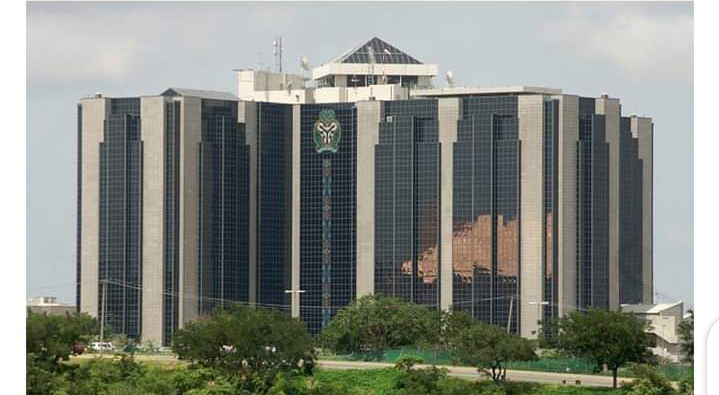

The Central Bank of Nigeria (CBN) has directed deposit money banks in the country to start charging 0.5% cybersecurity levy on some transactions done by their customers.
The apex bank gave the directive in a circular dated May 6, 2024 and sent to all commercial, merchant, non-interest and payment service banks as well as mobile money operators and payment service providers.
“Following the enactment of the Cybercrime (Prohibition, Prevention, etc) (amendment) Act 2024 and pursuant to the provision of Section 44 (2) (a) of the Act, ‘a levy of 0.5% (0.005) equivalent to a half percent of all electronic transactions value by the business specified in the Second Schedule of the Act’, is to be remitted to the National Cybersecurity Fund (NCF), which shall be administered by the Office of the National Security Adviser (ONSA),” the circular partly read.
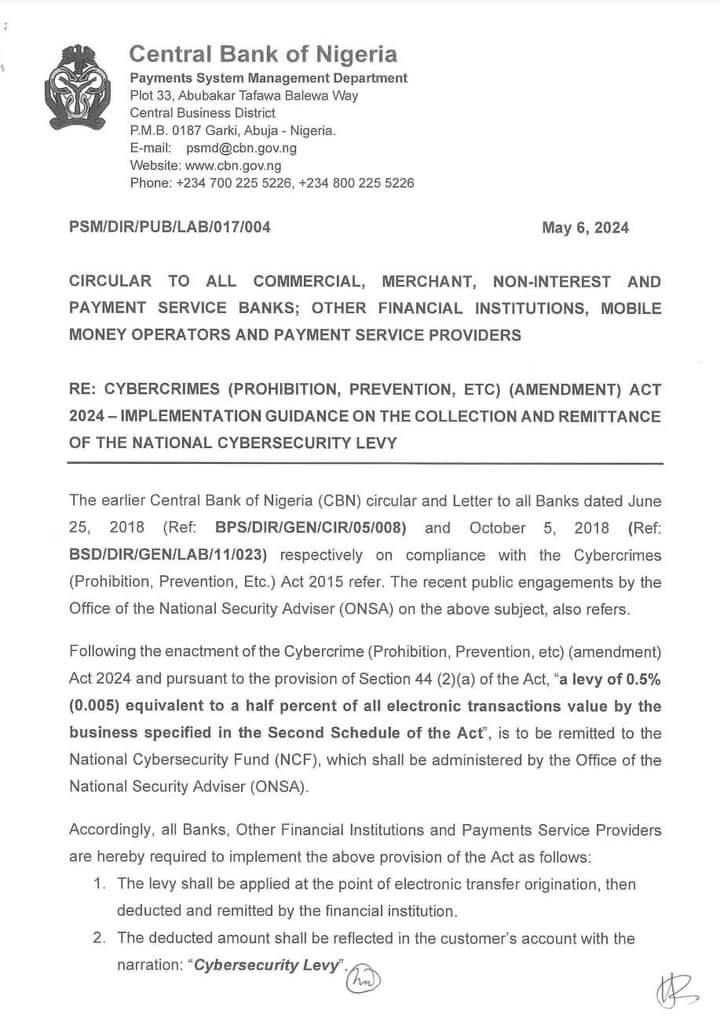

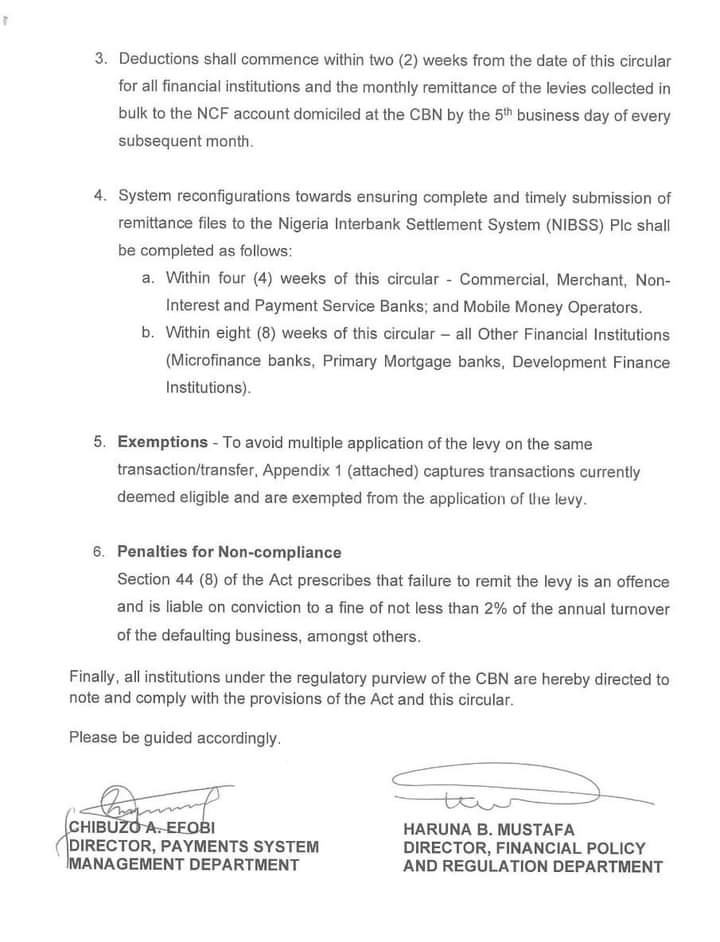

The apex bank said that the implementation of the levy would start two weeks from the date of the circular.
“The levy shall be applied at the point of electronic transfer origination, then deducted and remitted by the financial institution. The deducted amount shall be reflected in the customer’s account with the narration, ‘Cybersecurity Levy’. Deductions shall commence within two weeks from the date of this circular for all financial institutions and the monthly remittance of the levies collected in bulk to the NCF account domiciled at the CBN by the fifth business day of every subsequent month,” the circular said
The apex bank added that this new levy will not be applied on transactions such as loan disbursements and repayments, salary payments, intra-account transfers within the same bank or between different banks for the same customer, intra-bank transfers between customers of the same bank.
Also exempted from the levy were inter-branch transfers within a bank, cheque clearing and settlements, Letters of Credits, Banks’ recapitalisation-related funding only bulk funds movement from collection accounts, savings and deposits including transactions involving long-term investments, among others.
This current implementation however is not sitting well with some netizens as they reacted to the new development.
Here were some of their reactions from X.
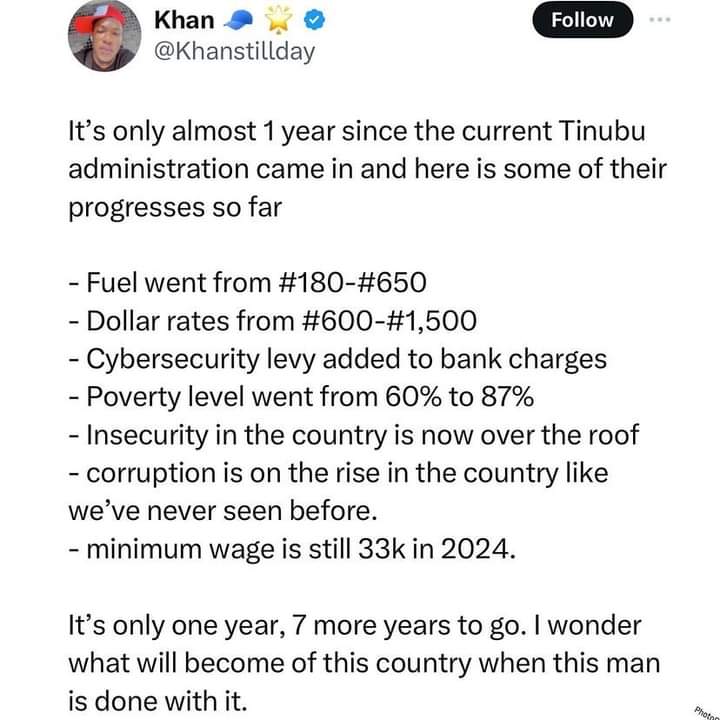

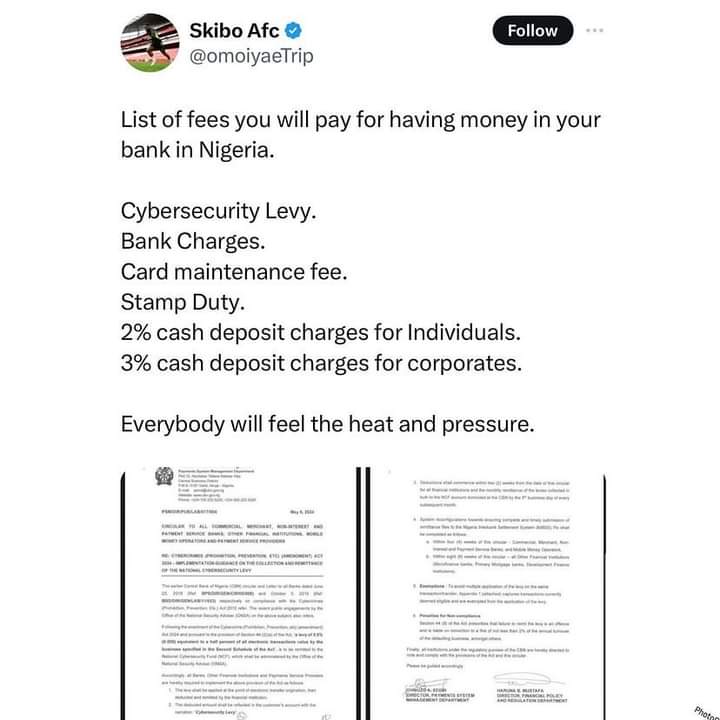



Finance
EFCC Chairman Tasks Nigerian Youths Against Crimes And Fraudulent Acts
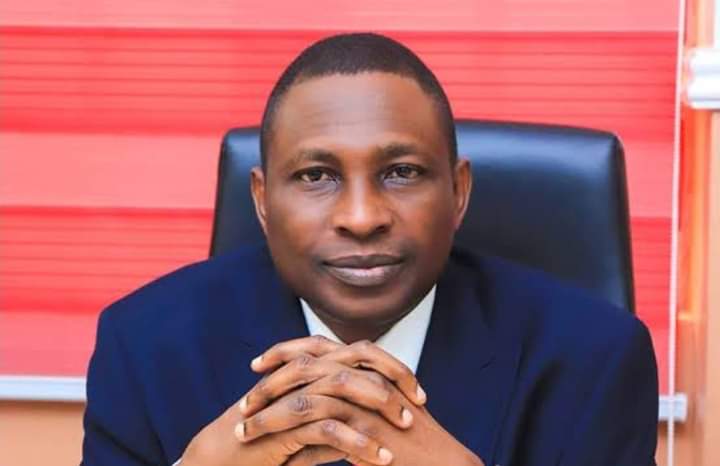

The Chairman of Economic Finance Crime Commission (EFCC), Ola Olukoyede, has stressed the need for Nigerian Youth to see themselves as agents of positive change that have a lot to contribute to the socioeconomic development of the Nation.
Speaking at the 2nd edition of a Leadership Trainings Programme in Abuja, Olukoyede, who was represented by the Head Enlightenment and Re-orientation unit, (EFCC), Aisha Mohammed, said the commission’s dream is to see the youth contribute meaningfully to the society, emphasizing on the need to work together in bringing positive change to society.
The Economic and Financial Crimes Commission Boss declared the readiness of his agency to work with all Stakeholders, including the youth towards changing the narrative and reposition the country to greater exploit.
Also speaking, the representative of the Executive Secretary of Tertiary Education Trust Fund (TETFUND), Sonny Echono, appealed to the youths is to eschew social vices that could deter their full potential in life.
Other speakers at the event, including the Chairperson, Zero Tolerance for Social Immoralities Initiative (ZEITI) Africa, Rasak Jeje called on all stakeholders to join hands in collective pursuit of empowering new generation of leaders to curb the rising tides of social Vice among Nigerian youths.
The Chairperson, Zero Tolerance for Social Immoralities Initiative (ZEITI) Africa, Rasak Jeje made the call while addressing journalists at the 2nd edition of it Leadership Trainings Programme in Abuja on Thursday.
He said the training was aimed to intimate students leaders with knowledge and insights that will help them drive positive change and become exemplary leaders in their respective spheres.
Finance
AISA Has Refunded The Fees Paid By Yahaya Bello To EFCC
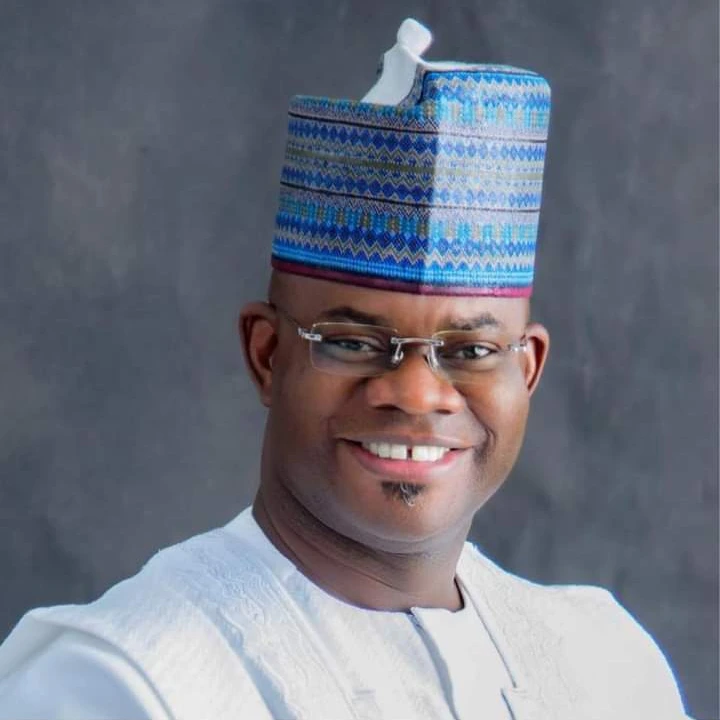

The Economic and Financial Crimes Commission (EFCC) says the American International School Abuja (AISA) has refunded the fees paid by the immediate past governor of Kogi state, Yahaya Bello, for his children attending the school.
In response to a letter addressed to the Lagos zonal commander of the EFCC, the school said $845,852 was paid in tuition “since the 7th of September 2021 to date”.
AISA said the sum to be refunded is $760,910 because it had deducted educational services already rendered.
“Please forward to us an official written request, with the authentic banking details of the EFCC, for the refund of the above-mentioned funds as previously indicated as part of your investigation into the alleged money laundering activities by the Bello family.
Since the 7th September 2021 to date, $845,852.84 (Eight Hundred and Forty-Five Thousand, Eight Hundred and Fifty Two US Dollars and eighty four cents) in tuition and other fees has been deposited into our Bank account.
We have calculated the net amount to be transferred and refunded to the State, after deducting the educational services rendered as $760,910.84. (Seven Hundred and Sixty Thousand, Nine Hundred and Ten US Dollars and Eighty Four cents).
No further additional fees are expected in respect of tuition as the students’ fees have now been settled until they graduate from ASIA.”
In a chat with The Cable, the spokesperson of the EFCC, Dele Oyewale, confirmed that the school has refunded the money.
‘’The money has been paid into public account,” Dele Oyewale was quoted as saying
-



 Politics4 days ago
Politics4 days agoPresident Tinubu Bans Purchase Of Petrol-dependent Vehicles By FEC Members
-



 Entertainment2 days ago
Entertainment2 days agoWhy I’m Not Ready For Kids – Singer Burna Boy Reveals
-



 News4 days ago
News4 days agoMath Teacher Accused Of Having Sex With 2 Students And Getting Pregnant For One Tearfully Reveals The Baby Was Taken Away From Her
-



 Entertainment3 days ago
Entertainment3 days agoMen Of The Lagos State Police Command Have Arrested Singer Portable
-



 News2 days ago
News2 days agoThe Peruvian Government Has Officially Classified Transgender, Nonbinary And Intersex People As “Mentally ill”
-



 GROpinion2 days ago
GROpinion2 days agoExposing the Malicious Sabotage of MoMo PSB Project in Enugu Ezike






